Give Me That Old Time Religion (Not)
U.S. News last week had an editorial, er, article European, Not Christian about the declining Christian population in Europe (vs the opposite trend in the U.S.). The claims of the article were fascinating. They boiled down to:
Increased Religiousness = Good
Increased Secularism = Bad
According to the article, unnamed "numerous analysts" suggest declining church attendance "is tied to a Europe-wide spiritual malaise that is pushing the Continent toward broad cultural and economic decline." Conversely, "a growing part of the U.S. electorate - and not just those associated with red America - would like religious values to play an even more prominet role in shaping the nation's laws and public life." (Kinda like Sharia was in Afghanistan, I guess).
Further claims are made for the failure of "atheistic humanism" because it lead directly to "the rise of the worst ideologies of the 20th century, fascism and communism." This move in the 19th century to a "less dogmatic and more rational faith" apparently led to both World Wars. The only possible silver lining offered up was either a return to that old time religion, or a modern variant that is just as "mystical and ecstatic" but more non-hierarchical and populist.
Supposedly directly attributable to this "spiritual boredom" is a decline in reproductive rates, which also has the effect of shifting European demographics from Christian to Muslim. The religious population in Europe that is increasing is the Islamic population, primarily driven by immigration (and driven as well by the declining Christian devotees). This is alluded to as a threat by the author. (Why an increasing Muslim fundamentalist population in Europe is a threat, while an increasing Christian population in the U.S. is not, isn't made clear).
Now, the article didn't provide much (any) in the way of factual support for its assertions. But hey, since when did reality get in the way of closely held religious beliefs? (You know, reality isn't really subjective - believing something doesn't make it true. I'm reminded of a story I heard once about Niels Bohr. Niels supposedly kept a lucky horseshoe. When asked whether he really believed in such superstitious nonsense, he replied: "Of course not, but I understand it works even if you don't believe in it." Like quantum mechanics. Or evolution.)
The parallels to the Red State/Blue State arguments I found interesting. (You know, the ones that go "Are you for a return to moral values, or do you support a rudderless secular elite liberalism that hates America?"). In these arguments, a correlation is claimed between the decline in church attendance (with its corresponding assumption of dedication to dogma), and an increase in a wide variety of perceived societal problems.
Since I was aware of the horrors that historically have occurred almost every time government and religious devotion combine, my distrust of these statements was immediate. (you know, jihads, crusades, inquisition, 30-years war - the whole appearance that monotheistic theocracies inevitably leads to atrocities)
Side Note - religious conflict causes wars. Wars cause most of the Four Horsemen ills of the world - conquest, famine, plague, death. And Tyranny.But, given that I believe you should pursue the evidence wherever it may take you, I decided to withold judgement until I could do some investigation.
Of all the enemies to public liberty war is, perhaps, the most to be dreaded because it comprises and develops the germ of every other. War is the parent of armies; from these proceed debts and taxes...known instruments for bringing the many under the domination of the few. ... No nation could preserve its freedom in the midst of continual warfare.
— James Madison, Political Observations, 1795
It was worse than I thought. Not only are the statements and the assumptions regarding the inferiority of the European standard of life vs. the US incorrect, just about every value judgement presented in this religious-tract-masquerading-as-an-article is also incorrect. In fact, it appears that pretty much the complete opposite of these claims is true - the more religious a society is, the worse the standard of living, literacy, gender equality, health, and life expectancy are.
In short, the data indicates a correlation between secularism and high standard of living (and conversely, religious adherence and low standard of living). Now, a correlation is just that - it doesn't presume that one factor causes another, it just indicates that the two factors are usually found together.
I attempted to gather facts about Europe, then Europe vs. the US, then finally stats across the world on various measures of standard of living.
Here's what I found. You tell me what it means.
Europe
A great analysis of intra-European standards of living from here. I'll quote most of it verbatum.
The Nordic countries are characterised by comparatively large government expenditures on social programmes, high rates of labour market participation, and limited financial dependence on the traditional family. Income disparities, class distinctions and poverty levels are the lowest in the industrial world; but the relative economic gap between generations is greater than in the rest of Europe, due largely to the early independence of young people.
The Southern European countries exhibit a pattern of relatively low expenditures on social programmes, heavy financial dependence on traditional extended families, and low levels of gainful employment, especially among women. Income disparities and class distinctions are quite pronounced and poverty levels are high, but the relative economic gap between generations is narrow.
The remaining European countries are intermediate in terms of both geographical location and institutional structure.
Figure 2 compares the European countries on the basis of a "traditional family index" comprised of five indicators, including average household size and the percentage of children below age thirty still residing in the parental home. The strongest traditional family patterns are to be found in Ireland, Spain, Italy, Portugal and Greece- all Catholic countries. The other extreme is exhibited by the Netherlands and the Nordic countries of Sweden, Denmark and Finland. Norway joins the remaining European countries to form the intermediate cluster on this dimension.
Figure 2 - Traditional Family Value Index
A more general consideration is the size of the dependency ratio, i.e. the number of individuals aged 16-84 who are gainfully employed in proportion to those in that age-range who are not employed. A high dependency ratio means that there is a relatively large segment of the population which is not participating in the labour market, and thus requires support from the family or the state.
Figure 3 - Dependency Ratios
Dependency ratios are influenced by a number of factors, including the population's age structure, gender roles and the demand for labour. Not surprisingly, dependency ratios correspond closely with the three type-clusters of European societies. The lowest ratio, 41, is that of Sweden, which has until recently placed the highest priority on full employment for both men and women. The highest dependency ratio, 111, is that of Italy, with its relatively widespread early retirement and traditionally low employment frequency among women.
As indicated in Figure 3, dependency ratios are low in all of the Nordic countries, and high in most of the southern countries. The two exceptions are the United Kingdom and Portugal, which in this respect are not included in the southern cluster due to comparatively high rates of female employment.
European Poverty Rates
The poverty rate averages about five percent in the Nordic countries, between 18-27 percent in the southern cluster, and roughly twelve percent in the intermediate cluster. As a consequence of neo-liberal policies implemented during the past 15-20 years, the United Kingdom is sinking to the Southern European level.
Europe vs. US
(With some other country stats thrown in as available...)Crime
Murder (per 100K)
South Africa 114.84
Brazil 22.98
US 5.61 (US runs from 5-10 since WWII link)
Canada 4.1
France 4.07
Italy 3.75
Monaco 3.33
Germany 3.23
Switzerland 2.41
Finland 1.71
UK 1.63
(2001 Interpol)
Rapes (per 100K)
US - 32.3
Brazil - 8.5
France - 16.0
Germany - 9.5
Italy - NR
(2001 Interpol)
Persons Incarcerated (per 100K):
Canada:114 (1999)
England&Wales:123
Germany:96
USA: 638 (WOW)
Russia: 632 (WOW)
France: 87
More 98-2000 crime stats here. A particular note for Swedish stats - Sweden reports more rapes and assualts then other countries because each one can be counted more then once. If a child if raped 1000 times over a 10 year perid then it is reported as 1000 rapes and 1000 assaults for the year that sick f*ck was finally caught. (See 1993 for a 25% jump in Swedish Rape statistics as this actually happens.) The same thing occurs for assaults. If 10 men beat one man then 10 assaults are reported.
Standard of Living
Real Per Capita GNP (1950/1980 = 1980 $)
Country Growth (%) 1950 ($) 1980 ($)
US 2 6,330 11,500
Canada 2.3 5,210 10,300
WG 4.9 3,170 13,370
Australia 2.9 3,960 9,400
France 4.4 3,360 12,160
Japan 7.4 1,060 8,900
U.K. 3.2 3,540 9,300
Health
Even though the U.S. spends a higher per capita GDP on health care, it spends significantly less on public health.
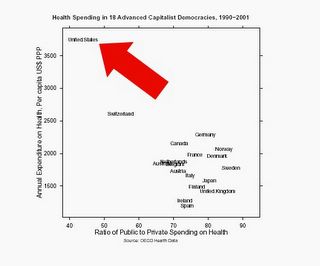
Health Care Spending
The U.S. had about the worst infant mortality compared to the 23 other wealthy capitalist countries, even though healthcare spending as a percentage of GDP was highest in the U.S. Note, though, that total healthcare spending as a percentage of GDP was not a very good predictor of infant mortality as a whole. Also, life expectancy of the European states was higher than the U.S. (link)
Vacations. Italians get 42 days of paid vacation every year, the French 37, the Germans 35, and the British 28. We Americans, meanwhile, take off only 14 of the 16 days to which we are entitled. Figures from the Bureau of Labor Statistics show that Americans also work a 49-hour-week, which adds up to 350 more hours of labor a year than the typical European worker. (link)_
Occupational Safety: About the same, with 4-5 deaths per 100,000 workers per year in both US and EU-25. However, in the US, this up from 2 per 100,000 just as recently as 1996 (correlated to cuts in OSHA?), and in the EU, this is driven primarily from the recent member states - the EU-15 has rates dramatically lower. (links here, here, and here)
I could go on, but I think you get the idea. Europe doesn't seem to be suffering from a "broad cultural and economic decline," particularly in comparison to the U.S. (Please hold the "if you like it so much why don't you move there" 5-year old nyaa nyaa nyaa argument. I might consider it, but I'm only fluent in english - as opposed to many Europeans who learn a second language from grade school.)
The World and Religion
So the arguments of the article just don't hold up to the facts. While European "religiousity" is declining, the standard of living is not. I realize that there are recent reports of a change in the economic conditions of some EU nations, but data reported in real time tends to be somewhat inaccurate. Time will tell if this is true or not. Regardless, this secularization trend has been going on for some time - it didn't just happen in the couple of years since the economic numbers reported above.
But what about my provocative contentions that religion is actually detrimental? Well, I don't have as solid a base of facts to support this, but there is some interesting data that I think you can draw some conclusions from.
First, let's look at countries from the perspective of "How Religious" they are. One measure of this may be to examine how many atheists are in the country. ( link )
Alternatively, we can look at the religions referenced in the article and see which countries have the largest populations of Islamic , Christian , and Hindu.
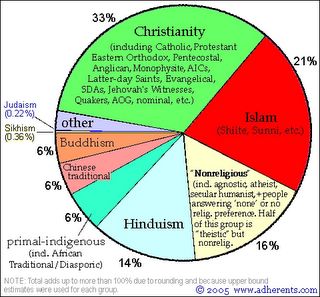
Religions of the World
Now, let's start looking at some stats on some countries and regions and see if we see any correlations.
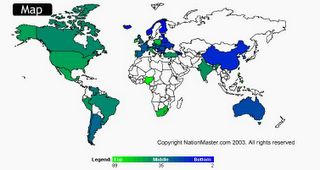
Church Attendance
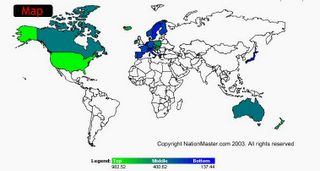
Teen Pregnancy Rates
No, those aren't the same map. Pretty darn close though.
What other interesting correlations do we see?
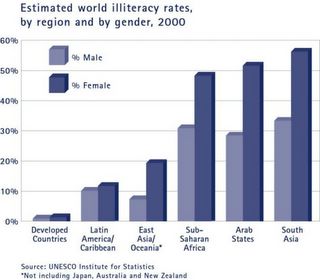
Illiteracy by Region
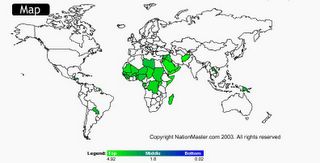
Population Growth Rates
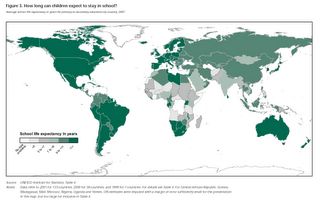
Length of Education By Region

Illiteracy in World
I find these next charts particularly interesting. There is absolutely a correlation between education and standard of living.
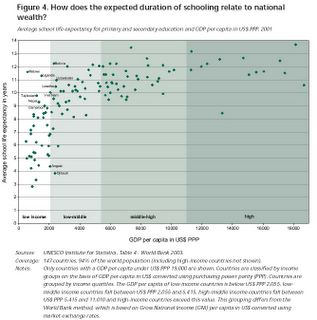
Education and GDP correlated
What's even more interesting in a world of primarily misogynistic religious dogma are the following maps. The first graph basically shows the same correlations we've been seeing, particularly between Europe and the U.S., that the less religious a country is, the more you have gender equity in earnings.
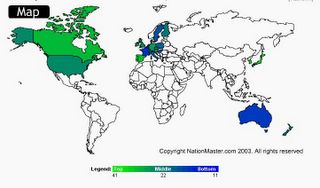
Male to Female Earnings Ratios
What's particularly instructive about this next graph is that it shows that the more gender equality in education there is, the likelihood is that overall country GDP will be higher as well. Again, correlation doesn't show which is cause, and which is effect - but it is fascinating information). The implication is that the more the country subscribes to a religion which diminishes the female role in the economy and society, the poorer that society will be.
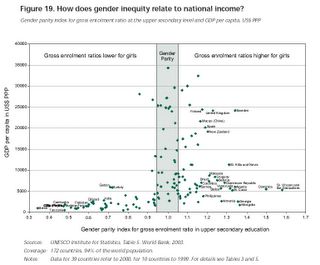
Gender Equality vs. GDP
Conclusions
So, based upon the evidence presented, would you rather live in a country that is becoming more secular, or more religious?
But perhaps I'm phrasing the question in the wrong framework. It may not be religiousness, per se, that correlates with lower standard of living. It may just be that it is classical organized heirarchical religion that correlates this way.
As the article states, there are signs in all this "moral decline" of a "spiritual reawakening," even though the article's attempts to characterize this new kind of spirituality is vague. The kicker was me was the section which showed the Vatican pleased and almost smug with the unquestioned assertions of the article. One Cardinal states, "Those Roman emperors who wanted to get rid of us, where are they today?" Alluding of course to the fact that despite the decline in Europe, the Eternal Church just seems to keep on ticking in new parts of the world. (Although this quote just cracks me up - Rome, through Republic and Empire, was growing until Christianity became the "official" religion of the government with Constantine I, at which point the decline and fall of Rome came relatively quickly - from 1000 years of growth to about 100 years to fall once Christian.)
No matter how many times humanity attempts to replace religion with rationality, sacraments with science, dogma with deduction, we keep reverting back to "that old time religion." Despite crusades, torture, corruption, and pederasty, religion just keeps on keepin' on.
Apparently if we're all very lucky, we can reestablish the primacy of religion, return to a "moral life" more in keeping with the history of organized religion, and reverse the correlated trends in education, equality, health and lifespan and standard of living.





